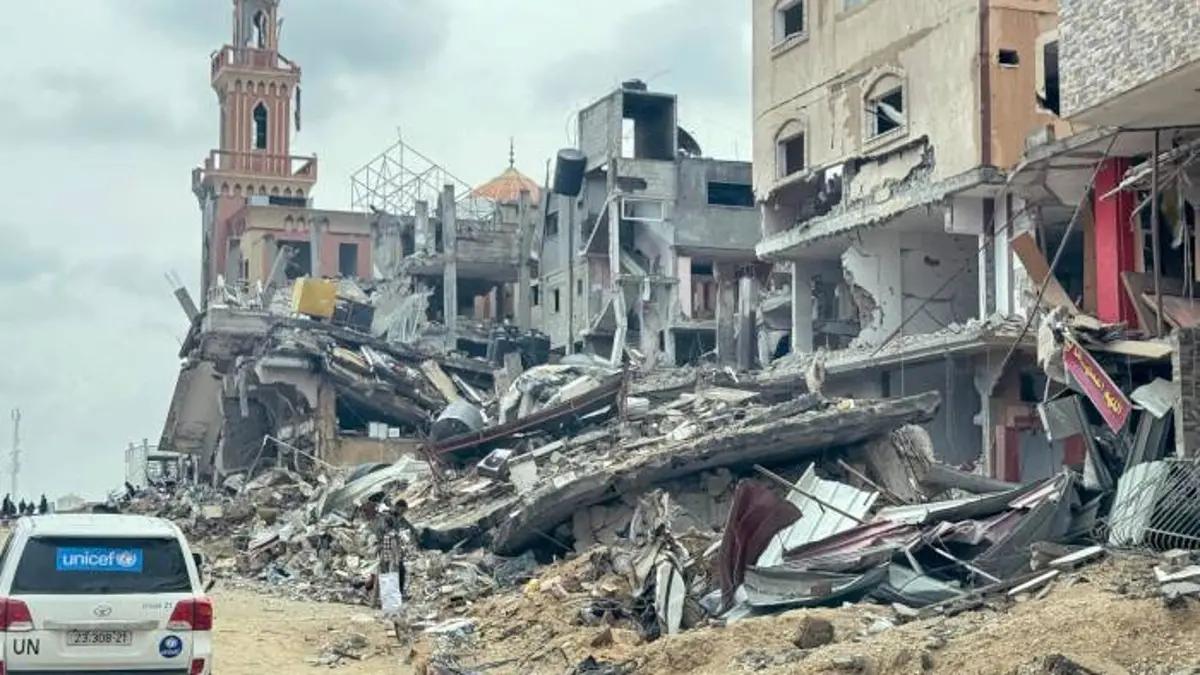
Amnesty International (AI) warned this Wednesday that the world is on the verge of the collapse of international law, due to repeated human rights abuses and frequent attacks in armed conflicts by States and armed groups, as in the current crisis in the Middle East.
The London-based non-governmental organization released its report ‘The state of human rights in the world’ of 2023, in which it lists a series of abuses in different countries, such as the repression of dissent, the illegitimate use of force against protesters or arbitrary arrests. This NGO also warned that the collapse of the rule of law is likely to accelerate with the rapid advance of artificial intelligence (AI) that, together with the mastery of big technologiesrisks further violation of people’s rights if regulation continues to lag behind.
Erosion of the rule of law
At a press conference in the British capital to present the document, the Secretary General of AI, Agnés Callamardrecalled that the Universal Declaration of Human Rights It was signed in 1948 and was intended for “all of us, without exception,” but now the world is witnessing an “erosion of the rule of law due to massive violations in the name of terrorism and security.”
Many powerful countries, he indicated, are abandoning “humanity and universality” enshrined in that declaration, signed under the motto “never again” due to the atrocities of World War II. “Amnesty International’s report paints a grim picture of alarming repression of human rights and prolific violations of international norms, all amid deepening global inequality, superpowers vying for supremacy, and a growing climate crisis. “, considered.
Armed conflicts
The report makes special mention of armed conflicts, indicating that the violation of international humanitarian law, also known as the “laws of war”, has had devastating consequences for the civilian population. In many armed conflicts, government forces have launched ground and air attacks against populated areas using weapons with a wide range of action, while racism occupies a central place in some of these conflicts.
Specifically, the crisis in Israel and the Occupied Palestinian Territories is linked to an extreme form of racial discrimination, AI points out. For the organization, the Israeli system of separation of the Palestinian people is based on Israel oppresses and dominates the Palestinian population through territorial fragmentation, segregation and controlthe withdrawal of land and property and the denial of economic and social rights.
In a conflict that shows no signs of abating, the evidence of war crimes continues to accumulate while the Israeli Government mocks, in its opinion, international law in Gaza. Following the Hamas attacks on October 7, Israeli authorities responded with relentless airstrikes against populated civilian areas, often annihilating entire families, forcibly displacing nearly 1.9 million Palestinians, and restricting access to aid. humanitarian aid that was desperately needed despite the growing famine in Gaza, he adds. “Israel’s blatant disregard for international law is compounded by the failure of its allies to stop the unspeakable civil bloodshed inflicted on Gaza. Many of those allies were the very architects of that post-World War II legal system. World War,” said the Secretary General.
Racial discrimination
Racial discrimination has also manifested itself in the responses to these conflicts, according to the report. Many governments have imposed illegitimate restrictions on protests in solidarity with the Palestinian population, he added. The governments of Germany, Austria, France, Hungary, Poland and Switzerland – the document indicates – pre-emptively banned this type of protests in 2023, alleging risks to public order or national security that, in some cases, were based on stereotypes. racists.
Dissent was repressed through crackdowns on freedom of expression, association and peaceful assembly, while arbitrary arrests, detentions and subjugation of human rights defenders, members of the political opposition and activists were documented. sometimes to torture and other ill-treatment. According to the text, many States neglected economic injustices and the climate crisis and governments frequently treated refugees and migrants in abusive and racist ways.
Among other things, AI denounces deep-rooted discrimination against women, LGBTI people and indigenous peoples, and highlights that multinational companies were participants in abuses. Amnesty focuses its report on several global trends: the treatment of civilians in armed conflict, the growing crackdown on gender justice, the disproportionate impact of economic crises, climate change and environmental degradation, and threats from new technologies, such as artificial intelligence.
In his opinion, these issues represent critical challenges for human rights around the world, which require a concerted response from States to address them and avoid new conflicts or the worsening of existing ones.
Source: Lasexta
Ricardo is a renowned author and journalist, known for his exceptional writing on top-news stories. He currently works as a writer at the 247 News Agency, where he is known for his ability to deliver breaking news and insightful analysis on the most pressing issues of the day.












